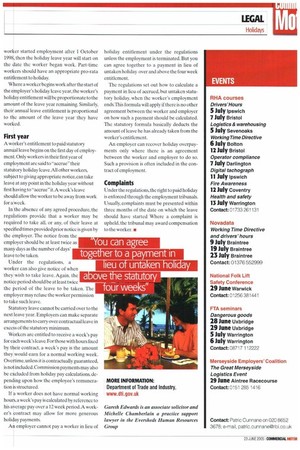Time for a break
Page 42

Page 43

If you've noticed an error in this article please click here to report it so we can fix it.
With the government pledged to improve workers' holiday rights it's vital that employers know where the law stands. Gareth Edwards and Michelle Chamberlain report.
Itillost employers will be aware that employees have a statutory right to four weeks' paid leave in each leave year, as set out in the Working Time Regulations. At present this period can include the eight days of UK public holidays.
However, the government plans to close this loophole and insist that public holidays are additional to the four weeks.
Four weeks is a minimum entitlement, but many workers have a greater entitlement under their contract of employment (contractual leave).
The regulations apply not just to employees but to a wider category of workers. The selfemployed are excluded so owner-drivers need not apply. As a general rule, for the purposes of the regulations, a person is a worker if he is someone who is paid a regular wage or salary and works for an organisation, business or individual.This would include seasonally hired drivers, for example.
A holiday leave year can start on any date in the year agreed between the worker and employer. If there is no such agreement, the holiday year will begin on 1 October 1998 (and subsequent anniversaries) for those who started work on or before 1 October 1998. If the worker started employment after 1 October 1998, then the holiday leave year will start on the date the worker began work. Part-time workers should have an appropriate pro-rata entitlement to holiday.
Where a worker begins work after the start of the employer's holiday leave year, the worker's holiday entitlement will be proportionate to the amount of the leave year remaining. Similarly, their annual leave entitlement is proportional to the amount of the leave year they have worked.
First year
A worker's entitlement to paid statutory annual leave begins on the first day of employment. Only workers in their first year of employment are said to -accrue" their statutory holiday leave. All other workers, subject to giving appropriate notice, can take leave at any point in the holiday year without first having to "accrue" it.A week's leave should allow the worker to be away from work for a week.
Under the regulations, a worker can also give notice of when they wish to take leave. Again, the notice period should be at least twice the period of the leave to be taken. The employer may refuse the worker permission to take such leave.
Statutory leave cannot be carried over to the next leave year. Employers can make separate arrangements to carry over contractual leave in excess of the statutory minimum.
Workers are entitled to receive a week's pay for each week's leave. For those with hours fixed by their contract, a week's pay is the amount they would earn for a normal working week. Overtime, unless it is contractually guaranteed, is not included. Commission payments may also be excluded from holiday pay calculations, depending upon how the employee's remuneration is structured.
If a worker does not have normal working hours, a week's pay is calculated by reference to his average pay over a 12 week period.A worker's contract may allow for more generous holiday payments.
An employer cannot pay a worker in lieu of holiday entitlement under the regulations unless the employment is terminated. But you can agree together to a payment in lieu of untaken holiday over and above the four week entitlement.
The regulations set out how to calculate a payment in lieu of accrued, but untaken statutory holiday, when the worker's employment ends.This formula will apply if there is no other agreement between the worker and employer on how such a payment should be calculated. The statutory formula basically deducts the amount of leave he has already taken from the worker's entitlement.
An employer can recover holiday overpayments only where there is an agreement between the worker and employer to do so. Such a provision is often included in the contract of employment.
Complaints
Under the regulations, the right to paid holiday is enforced through the employment tribunals. Usually, complaints must be presented within three months of the date on which the leave should have started Where a complaint is upheld, the tribunal may award compensation to the worker. •












































































































































































































